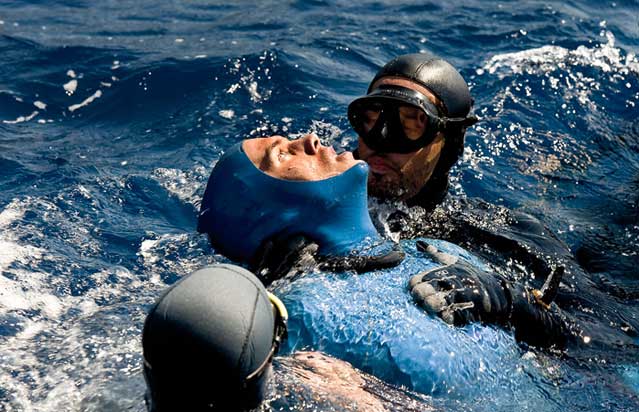During my week at the World Freediving Championships, divers kept telling me I should start training and try it myself someday. So I did startãwith an out-of-the-water session on breath-holdingãandô it blew my mind. It also hurt. Like hell.ô
Open Your Mouth and You're Dead
James Nestor tagged along with several athletes at the World Freediving Championships in Greece last year.My teacher was , a South African freediving instructor and yoga teacher who gave me a private, two-hour lesson designed to increase my personal breath-hold best to somewhere north of 60 seconds. We met at a covered patio overlooking Messinian Bay, laid out yoga mats, and started off with some rib-expanding stretches. Prinsloo explained that, through yoga and breathing exercises, freedivers develop up to 85 percent more lung capacity than the average person. Freediver , who inô 2009ô set the world breath-hold record of 11 minutes, 35 seconds, boasts a 10.5-liter lung capacity, versus six liters for an average adult male.ô
But bigger lungs are only part of it. What does the rest is ourô ãmammalian diving reflexes,ã a series ofô automatic physiological triggers that kick in the second we enter the water. The moment we submerge, our heartrate automatically slows down 25 percent, decreasing our need for oxygen and allowing us to hold our breath longer. As we dive deeper, past 100 feet, the capillaries in our legs and hands close off to save blood for more important areas like the heart and brain. At extremely deep dives (around 300 feet), a ãblood shiftã occurs, in which the walls of our organs, working like pressure-release valves, magically begin to allow the free flow of blood plasma and water from surrounding circulatory walls into the organs themselves. Without this shift, the organs would be crushed by the incredible water pressure. As we ascend, the reflexes reverse. By the surface, we become land mammals again.
ãThe water is where we came from,ã said Prinsloo, transitioning me into yet another downward dog. ãAll freedivers are doing is relearning what our bodies already know. You are born to do this!ã
That is, so long as I can take the convulsions. The human body is programmed with a three-stage defense system that helps freedivers gauge how much more they can take. Stage one is marked by convulsions, caused by the buildup of carbon dioxide in the bloodstream. Then the spleen kicks in, delivering fresh, oxygen-rich blood so fast that you can feel it. The last line of defense is the blackout, which occurs when the brain, sensing that thereãs no longer enough oxygen to support itself, shuts off to conserve energy for other organs. This triggers the larynx to close up, sealing the throat and inhibiting water from entering the lungs. In the blacked-out state, the human body can survive up to 10 minutes underwater without permanent damage.
At the end of the lesson, I leaned back on my yoga mat for a breath-hold attempt. Big inhale. Prinsloo started the stopwatch, and I closed my eyes. After a while, I felt my body convulse, my stomach wriggling as if an alien baby was punching its way out. I felt horrible and claustrophobic. I imagined what it must be like to have these sensations 200 feet below the surface. The thought freaked me out even more. Some time later, it felt like a wet blanket had been thrown over meãthe spleen doing its thing, I gathered. Then the darkness behind my closed eyes got somehow darker, ambient noise of the pool area faded, and I started drifting off to sleep.
ãBreathe!ã said Prinsloo. I came to and gasped for air. I was dizzy, having trouble focusing through fluttering eyes, but I felt good. Prinsloo smiled, nodded, and showed me the stopwatch. Surprise: I just held my breath for three minutes, ten seconds.


